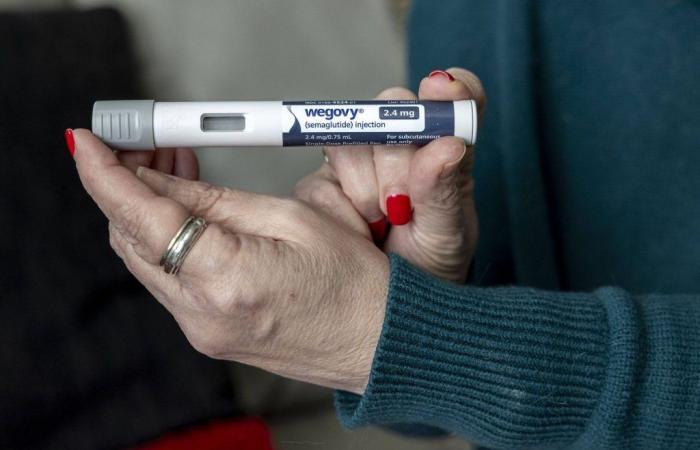His arrival did not go unnoticed in pharmacies. Since Tuesday October 8, the flagship anti-obesity drug Wegovy has been available in pharmacies. The Novo Nordisk laboratory, a Danish pharmaceutical giant, has launched its marketing in France. The National Medicines Safety Agency, however, announces strict supervision of the drug.
Read also >> Wegovy, Ozempic, Mounjaro… How pharmaceutical giants are tackling obesity
1. What is Wegovy?
Popular in the United States, Wegovy is a medication for people suffering from severe obesity. It is “one of the first born of the new generation of anti-obesity drugs: semaglutide, its active ingredient, mimics an intestinal hormone (GLP-1) supposed to promote the secretion of insulin and send a signal to the brain satiety,” explains “Libération.”
The same molecule is for example used in Ozempic, intended for patients suffering from diabetes. Wegovy comes in the form of an injector pen which patients must inject one dose of each week.
2. What are its access conditions in France?
Until now, Wegovy was only available to certain patients. The drug was authorized by the European Medicines Agency in early 2022. In France, it was only accessible to a test sample of 10,000 patients suffering from severe obesity. “We prescribed it to everyone eligible under early access and we saw completely unexpected results. Never seen before,” emphasized endocrinologist Muriel Coupaye to ELLE.
Its access conditions remain today closely regulated by the National Medicines Safety Agency (ANSM). “Cases of misuse with aGLP-1 are proven, in particular diversion for aesthetic purposes by people for whom this treatment is not indicated,” explains the ANSM in a press release published Tuesday October 8 on the use of the medicine.
Access to Wegovy therefore requires a prescription from a specialist doctor “in endocrinology-diabetology-nutrition or holder of specialized transversal training in “Applied Nutrition””, indicates the agency. The medication is also reserved for patients under 65 years of age, with an initial body mass index (BMI) greater than or equal to 35 kg/m2.
Treatment renewals can then be carried out by general practitioners. “This medication should only be used as a second line, in the event of failure of nutritional support and in combination with a low-calorie diet and physical activity,” adds the press release.
3. Is it effective?
On Franceinfo this October 8, the French general manager of Novo Nordisk, Etienne Tichit, highlighted “15% to 17% weight loss, and 15% reduction in cardiovascular risk”. The “Select” clinical trial, cited by “Libération”, showed at the end of 2023 a 20% reduction in death, heart attack or stroke due to cardiovascular disease with taking Wegovy.
“Until now, the therapeutic arsenal to treat this pathology [l’obésité, N.D.L.R.] was thin. On the drug side, only Saxenda, a first-generation GLP-1 analogue, also produced by Novo Nordisk, was available in France,” underlines “Le Monde” in an article on the subject.
4. Are any risks proven?
Several side effects of Wegovy, such as gastrointestinal disturbances, are already known – knowing that it must be taken for life. Several patients testified at the beginning of September in “Libération” about “numerous side effects”.
These included abdominal pain, vomiting and fatigue. These effects push one in ten people to interrupt treatment, reports the daily. Other more serious but less common effects have also been reported, including pancreatitis and intestinal obstruction.
5. Is it reimbursed by Health Insurance?
Wegovy is not reimbursed by Health Insurance. Its price remains freely set by Novo Nordisk. Depending on the laboratory, this should be between 9 and 12 euros per day, depending on the margins taken in particular by pharmacies. Or between 274 and 365 euros per month.
“We are happy both because we are opening up the therapeutic field of treatment possibilities and disappointed, because this will create unequal access to care,” reacted the president of the National Collective of Obese Associations Anne-Sophie Joly with the “World”.
On Franceinfo, Etienne Tichit said he hoped the drug would soon be reimbursed by Social Security. “We are doing everything to prove to the health authorities that, today, we are going much further than weight management,” he assured. The High Authority for Health must reassess the drug service “by the end of the year”.






